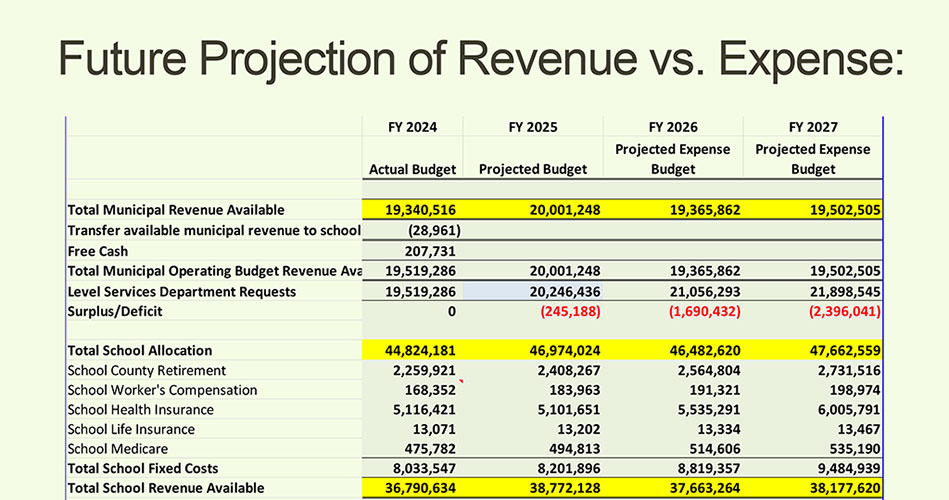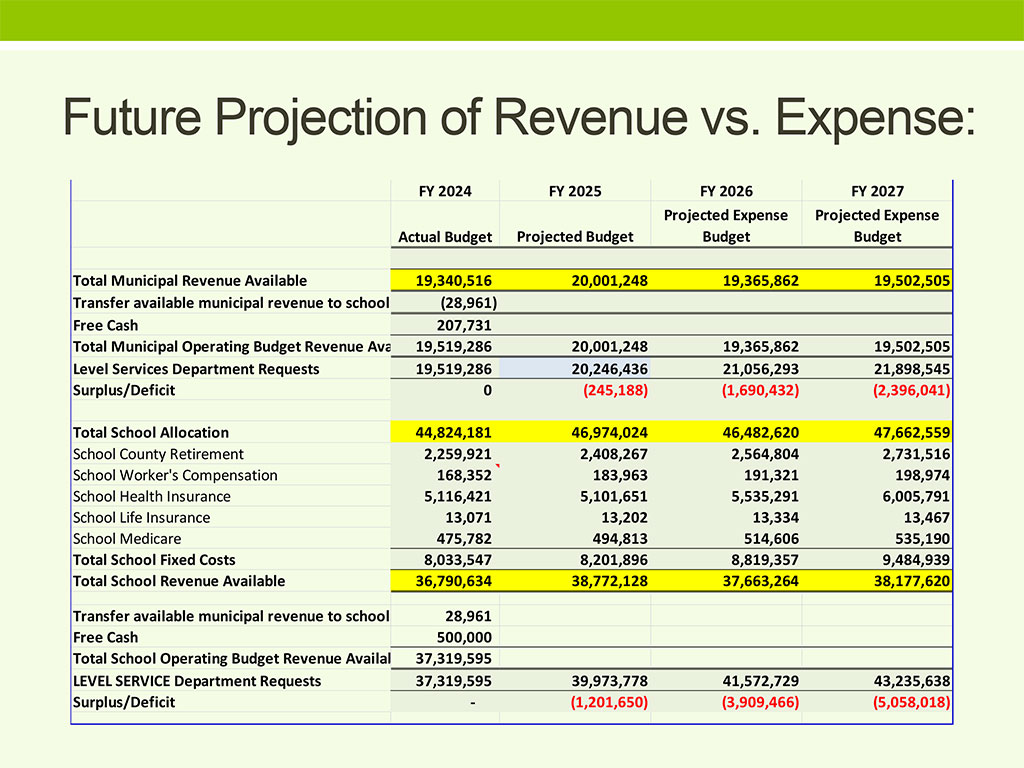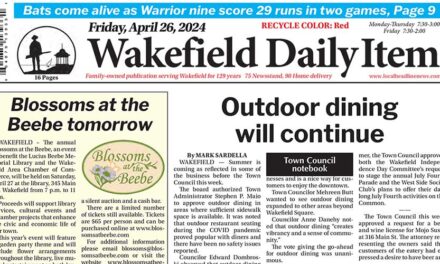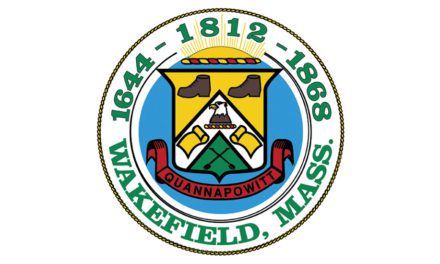By MAUREEN DOHERTY
NORTH READING — The current budget challenges faced by those tasked with crafting the Fiscal Year 2025 annual budgets for the schools and municipal government were not unanticipated.
In fact, Town Administrator Michael Gilleberto forewarned voters at last year’s June Town Meeting that the town’s ability to carry the FY23 budget into FY24 “was strained” explaining that “arriving at a balanced budget for FY2024 was a difficult process for the Financial Planning Team” due to a “significant reliance on one-time funds for one-time costs” rather than raising funds through taxes, local receipts (such as excise taxes) and state aid.
While the FY24 budget under which the town is currently operating was ultimately balanced prior to the annual Town Meeting, this was achieved by eliminating or postponing many requests that municipal and school officials felt were necessary to properly run their respective departments while relying too much on “high amounts of Free Cash,” which Gilleberto predicted would not be available to the same extent in future years for a variety of reasons.
Last June, Gilleberto foreshadowed in his slideshow presentation to the voters: “FY2025 will be even more difficult. The community will face difficult discussions about its priorities, including what it can and cannot afford to do within the limits of Proposition 2 1/2 and our other revenue streams.”
In other words, a potential operating budget override request may be on the horizon for the first time in nearly 20 years in spite of their best efforts to crunch the numbers by turning their budgets upside down and inside out.
Throughout this month, the town’s various department heads have made their pitches during joint meetings of the Select Board and Finance Committee regarding their budget priorities. In between meetings, the town’s Financial Planning Team meets to dice up the numbers even more and perhaps pull a rabbit or two out of a hat.
Across town, the School Department is going through the same process as it prepares for its annual public hearing on the FY25 school budget on Monday, April 8. The school budget was initially presented to the School Committee on March 11 and the School Department will host a budget webinar this Friday, March 29, from noon to 1 p.m. It will be led by Michael Connelly, the assistant superintendent of finance and operations, and Superintendent of Schools Dr. Patrick Daly and provides a daytime option for community members to ask questions about the school budget.
The Finance Committee and its various subcommittees also meet continuously throughout the spring, directly with various department heads in an effort to make its recommendations to the voters at Town Meeting
North Reading is fortunate in comparison with some other communities to use a unique Financial Planning Team model where representatives of the School Committee, Finance Committee and Select Board meet in a cooperative fashion with the town’s financial experts to refine their respective budgets and decide upon shared fixed costs as well as the split between the percentage of available funds to be devoted exclusively to the school budget and the municipal budget.
STILL EARLY IN PROCESS
For all the dire predictions, however, it is still early in the budget honing process. Town Administrator Michael Gilleberto and Finance Director Laurianne Galvin discussed the current municipal budget challenges recently with the Transcript. Gilleberto said he does not typically give his recommendations to the Select Board on each department head’s budget this early in the process but he feels that for FY25, it is necessary to be open with the town as a whole on the current budget challenges sooner rather than later.
This week, he has been setting up a link to a new page on the town’s website called Budget Central where he has posted all of the documents related to the FY25 budget proposals, including the nearly 300-page town budget book and each PowerPoint or slide show presentation submitted by the town’s boards and committees. The link is on the home page. The School Department budget is also included, go to: northreadingma.gov/home/news/new-fy-2025-budget-central
INCREASINGLY TIGHT BUDGET MARGINS
“The best way to summarize it is we’ve had consecutive years of increasingly tight budget margins that we’ve been able to balance through a variety of different actions, most of which rely on the use of Free Cash,” Gilleberto explained.
Referring to a chart in the presentation he made to the Select Board on March 18 entitled: “Comparison of prior year revenue projections to level services requests,” Gilleberto explained that it shows the “progression of the increasing pressure on the budget deficit” that he had touched upon with the Select Board when they were preparing the FY23 budget.
During the past three consecutive fiscal years, the gap between the “Total Municipal Operating Budget Revenue available” and the ability to provide the town with “level service department requests” continues to grow for both the municipal side and the schools.
In FY23, on the town side, that gap was $213,256 ($18,825,779 vs. level services requests of $19,044,035)
In FY24, on the town side, that gap was $329,111 ($19,169,277 vs. level services requests of $19,498,388).
In FY 25, on the town side, that gap is $245,188 ($20,001,248 vs. level services requests of $20,246,436).
Galvin explained that the FY24 gap was larger than what is being presented now for FY25 because she has taken a different approach to the FY25 budget.
That snapshot of the $329,111 budget gap at this point in the process last year was due to the fact that “this was before we did some of our final changes to push our revenue estimates as far as we can,” Galvin said. [For FY25] we’ve moved certain items off the Free Cash and other reserve use, so we are at a slightly different point than we were in 2023 and 2024 at this time.”
A similar snapshot taken of the School Department budget for FY23, FY24 and FY25 shows a larger progression in the level services budget gap.
In FY23, on the school side, the budget gap in the “Total School Operating Budget Revenue available” vs. level services requests was $221,066 ($35,474,330 vs. $35,695,396).
In FY24, on the school side, that gap was $1,026,241 ($36,428,179 vs. $37,464,420)
In FY25, on the school side, that gap is now about $1,201,650 ($38,772,128 vs. a level services request of $39,973,778).
The School Department numbers are being provided here simply for comparison to provide a complete budget picture for Transcript readers; Gilleberto emphasized that he and Galvin were not speaking on behalf of the School Department, which will be hosting a webinar on its budget tomorrow (Friday, March 29) from noon to 1 p.m. which the public can join and ask questions. The School Department will also have an evening public hearing on its budget on Monday, April 8.
In an article written by Assistant Superintendent of Finance and Operations Michael Connelly and published in the March 14 Transcript, he states that the FY25 budget gap in the School Department budget recommended by Superintendent Dr. Patrick Daly totals $1.9M. Connelly stated that school administrators would continue to work closely with town officials to close this budget gap.
“Among those options that will be discussed is the possibility of an operating budget override. Such an option has not been done in North Reading since 2005,” Connelly wrote. “Many of the decisions to bring the Fiscal Year 2025 budget into balance will be very difficult ones on the part of the Administration and the School Committee in the coming weeks as we work to find a solution to the large budget gap that exists.”
The budget gaps in both FY 23 and FY24 were eventually worked out as both the municipal side and the school side presented balanced budgets – as required by law – to the voters at Town Meeting.
FUNDING FOR 4 NEW FIREFIGHTERS
Concentrating on the municipal budget gap, Gilleberto said even though the town’s level services budget shortfall is $245,188, he believes it will be crucial in FY25 to fund the four additional firefighters that Fire Chief Don Stats has been requesting for years in order to have a properly staffed on-duty crew without the need for unnecessary callbacks. Recommending this add-on would increase the budget gap on the town side by an additional $341,714 to $586,902 in order to cover both the salaries and benefits of these four firefighters.
“So now we’re in an exercise of having to find $586,902 worth of reductions in order to have a balanced budget based on what’s available,” Gilleberto said.
NEW GROWTH FIGURES STALLING
Over the past several years, North Reading has benefitted greatly from new growth to help expand the town’s tax base. Bolstering this new growth for the past several years has been the construction of 502 condominium units in nine buildings plus a clubhouse at Martin’s Landing off Lowell Road for residents 55-plus. But as this development by Pulte Homes approaches build-out the town’s new growth figures will continue to decline sharply and then zero out.
In FY24, the town’s actual new growth figure was $1,483,962. Projected new growth for FY25 totals $975,000 and of this estimate, more than half ($495,638) will come from Pulte Homes at Martins Landing. Last year, Gilleberto said, Pulte informed the town that they’d be slowing down their construction schedule; however, something must have changed because they ended up building three new buildings in the past year, bringing them closer to build-out, he said.
In FY25, the town’s projected revenues will total $81,311,065, which is an increase of just over $3M from the FY24 actual revenues of $78,310,652.
Of the FY25 projected total General Fund revenue of $81,311,065, the shared fixed costs between the town’s municipal and school departments is projected to be $11,082,707 which would provide net revenue available to be shared by the municipal and school departments of $70,228,359. Of this total, the projected net municipal portion of the budget is $20,001,248.
The municipal side has identified $586,902 in reduction to FY25 budget request by various departments in an effort to fund those four firefighters.
FUTURE BUDGET FORECASTS
Forecasting out to FY27, in the chart accompanying this story, the town’s Finance Department has provided the future projection of revenue vs. expenses for FY25, FY26 and FY27 in comparison to the town’s actual overall budget approved for FY24 (which runs through June 30, 2024).
In this scenario, FY24 was perfectly balanced with a level services budget of $37,319,595 while FY25 is anticipated to have a total deficit of $1,201,650 on a level services budget of $39,973,778. FY26 would have a budget gap of $3,909,466 on a projected level services budget of $41,572,729. FY27 would have a hurdle of $5,058,018 to clear with a level services budget of $43,235,638. Of this $5M budget gap, $2.9M of it would affect the municipal side of the tally sheet.






